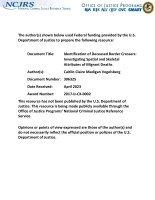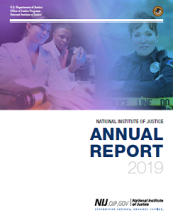Missing persons
Highlighting Significant NIJ Forensic Science Investments: The University of Tennessee, Knoxville Site Visit
Technological Solutions for Rural Medical Examiner Facilities
Microhaplotypes in forensic genetics
Assessment of carbon, oxygen, strontium, and lead isotopic variation in modern Colombian teeth: An application to human identification
OsteoID: A New Forensic Tool to Help Identify the Species of Skeletal Remains
NIJ-supported researchers developed a free web tool to help forensic investigators and others interested in bone identification.
NIJ Awards $16M to Support Forensic Science Research
On September 26, 2023, NIJ announced $16 million in new funding to support 33 projects under the FY23 Research and Development in Forensic Science for Criminal Justice Purposes solicitation. Through this program, NIJ continues to advance the speed, accuracy, and reliability of forensic analysis, which ultimately bolsters the administration of justice.
Funding Highlights for Fiscal Year 2023
Since 2009, NIJ has invested nearly $300 million...
Webinar: NIJ Research Assistantship Program Informational Webinar
This recorded webinar, originally held September 28, 2023, provides information on NIJ’s Research Assistantship Program, which offers highly qualified doctoral students the opportunity to bring their expertise to NIJ to work across offices and program areas to obtain a practical and applied research experience. The program is a research focused professional development opportunity for doctoral students from all academic disciplines. NIJ...
Optimization of InnoXtract (TM) extraction and purification system for DNA extraction from skeletal samples
Quantifying the accuracy of low quality DNA sample analysis from genotyping to genealogical searching and integration as a bioinformatic pipeline
Evaluating the reliability and accuracy of multiple geophysical methods in the search for clandestine graves
Cold Cases and Serial Killers, Part 1
In April 2018, the Golden State Killer, Joseph DeAngelo was arrested. NIJ support helped lead to his arrest, and in the aftermath of the arrest, NIJ Social Science Analyst Eric Martin was among those tasked with finding other cases NIJ helped law enforcement solve. Eric joins the show to talk about some of those cases, and answer some broader questions about serial killers: What is a serial killer? Are they on the rise? How do we know how many serial killers are currently active?
Assessing Solvability Factors in Missing Person Cases: A Mixed-Method Approach
Evaluation and Implementation of High Throughput Second Generation Sequencing for Mitochondrial DNA Testing in Missing Persons and Forensic Casework at the UNT Center for Human Identification
Streamlining the decision-making process for international DNA kinship matching using Worldwide allele frequencies and tailored cutoff log(10)LR thresholds
Native Missing Persons Cases Will Not be Solved by Police Alone The Case for Missing Persons Advocates
Missing Native American Persons: Nebraska Study Details Scope of Problem, Urges Culturally Sensitive Research and Better Access to Justice
MPKin-YSTR: Interpretation of Y chromosome STR haplotypes for missing persons cases
Identification of Deceased Border Crossers: Investigating Spatial and Skeletal Attributes of Migrant Deaths
Just Science Podcast: Just Managing Mass Fatality Incidents
Just Science Podcast: Just Investigative Support for Indigenous Communities
Interpretation of Y Chromosome STRs for Missing Persons Cases
Gender-Based Violence and the Latinx Community
See the YouTube Terms of Service and Google Privacy Policy






